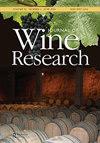Wine farmworkers, provenance stories and ethical value claims
Q2 Agricultural and Biological Sciences
引用次数: 0
Abstract
ABSTRACT The article extends past research on ethical value claims in two ways. First, research often centres on certifications as mechanisms of ethical claims-making; in contrast, we focus on provenance stories as devices of wine brand differentiation and ethical value creation. Second, while value claims are broadly understood as co-creative outcomes involving producers, intermediaries, and consumers, we focus on manual farmworkers, who are largely absent, as story subjects and storytellers, in agri-food provenance stories and value claims. Focusing on the South African wine industry, we sought to identify alignments between winery brand stories and farmworker heritage stories as a potential route for farmworkers to contribute to and be more securely included and recognized within premium wine value chains. Analysis of a comparative sample of South African, French, Italian and Australian winery websites identified provenance as the dominant frame for ethical value claims, family as a primary anchor for provenance, and South Africa’s distinctive prevalence of representations of farmworkers in winery communications. Two ‘storytelling workshops’ with Cape Wineland farmworkers generated resonant themes – community and familiness; expertise and pride – that aligned with dominant market expectations and credence cues, and could potentially serve as credible, authentic anchors for South African wine value claims.葡萄酒农场工人,产地故事和道德价值主张
本文从两个方面扩展了以往关于伦理价值主张的研究。首先,研究往往把认证作为伦理声明的机制;相反,我们关注的是产地故事作为葡萄酒品牌差异化和伦理价值创造的手段。其次,虽然价值主张被广泛理解为涉及生产者、中间商和消费者的共同创造成果,但我们关注的是手工农场工人,他们在农业食品来源故事和价值主张中基本上没有作为故事主体和故事讲述者。专注于南非葡萄酒行业,我们试图确定酒庄品牌故事和农场工人遗产故事之间的一致性,作为农场工人为优质葡萄酒价值链做出贡献并更安全地纳入和认可的潜在途径。对南非、法国、意大利和澳大利亚酒庄网站的比较样本进行分析,发现出处是伦理价值主张的主要框架,家庭是出处的主要支柱,南非在酒庄沟通中普遍存在农场工人的代表。与开普瓦恩兰农场工人一起举办的两次“讲故事研讨会”产生了共鸣的主题——社区和家庭;专业知识和自豪感——与主流市场预期和可信度线索一致,并可能成为南非葡萄酒价值主张的可信、真实的锚。
本文章由计算机程序翻译,如有差异,请以英文原文为准。
求助全文
约1分钟内获得全文
求助全文
来源期刊

Journal of Wine Research
Agricultural and Biological Sciences-Horticulture
CiteScore
2.40
自引率
0.00%
发文量
10
期刊介绍:
The Journal of Wine Research is an international and multidisciplinary refereed journal publishing the results of recent research on all aspects of viticulture, oenology and the international wine trade. It was founded by the Institute of Masters of Wine to enhance and encourage scholarly and scientific interdisciplinary research in these fields. The main areas covered by the journal include biochemistry, botany, economics, geography, geology, history, medicine, microbiology, oenology, psychology, sociology, marketing, business studies, management, wine tasting and viticulture.
 求助内容:
求助内容: 应助结果提醒方式:
应助结果提醒方式:


